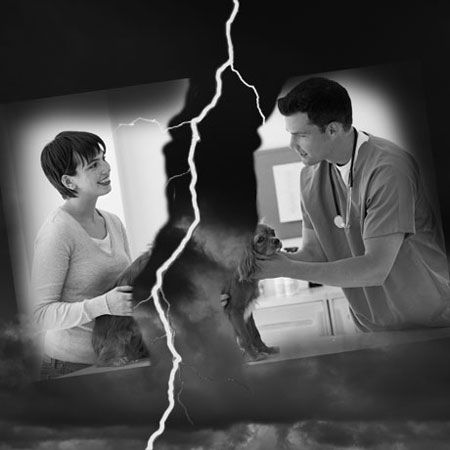3 Dr. Google horror stories that reflect the veterinary profession's new normal
Many clients aren't on the same page with you about your expertise-they're relying on the Internet for veterinary advice.

When Dr. Google strikes! Clients may not see the immediate horror of some advice found on the Internet until it's too late. (Getty Images)
Veterinary medicine is full of qualified professionals who care about animal welfare, but strangers giving veterinary advice on the Internet hold sway with many veterinary clients.
The appeal of “Dr. Google”-the source for many clients' first opinions-is its availability. Whether clients are on their smartphones, tablets or desktop computers, clients' access to the Internet provides them an effortless way to find answers to questions about their animals. Apps have capitalized on this convenience as the courts decide the future of the Internet's role in veterinary medicine.
These three stories from veterinarians may paint a troubling picture of the future and practicing with clients who are armed with faulty Internet advice. (Want some advice for communicating with these kind of patients? Click here.)
Swapping gender roles
A client brought her 12-week-old puppy in for booster vaccinations. After greeting the two and reviewing the client's pink chart (we use pink for females and blue for males), I began the exam and discovered an abnormal appendage for a female-a penis.
I assumed our receptionist had made a mistake with the chart color, but I said to the client, "You are aware this is a male dog, right?" She said, "No it's not. The breeder told me it was a female." I responded, "Well, ma'am, it's a male,” picked the dog up in the air to point to the penis and said, “because this is Mr. Wanky."
The client was dumbfounded. She said that she purchased the "female" dog, noticed the appendage on the belly and Googled "female dog with lump on belly.” Dr. Google assured the client that it was an umbilical hernia and nothing to worry about. Fortunately, she sought veterinary expertise, the puppy was neutered and he's living a very happy male life right now.
Jeremy Keen, DVM
Jackson, Tennessee
A bitter pill to swallow
A client came in panicking that her dog was "bleeding out" because she was vomiting blood. I scurried to the exam room, and the patient's mouth was very reddish-pink. However, the dog appeared healthy and in good spirits. After I asked the client what had happened, she said that she gave the antibiotic pill that our clinic had prescribed, and a few minutes later the dog started drooling “blood.”
The client freaked out and went to Dr. Google. It was an adverse reaction to the medication, according to Google, and (an excessive amount of) hydrogen peroxide would get the medication out of the system. The dog vomited multiple times but continued to have reddish slobber. At that point, the client decided it might be wise to go back to the veterinarian.
I took another look in the mouth and found the problem in the back of the mouth by the molar teeth-the antibiotic pill was wedged against the gum line. Combined with slobber, the pill produced the “blood.” The dog was going to be fine, but she continued to vomit due to the hydrogen peroxide. We had to place her on IV fluids and give her anti-nausea meds until she recovered.
Jeremy Keen, DVM
Jackson, Tennessee
Blindsided
We had a case involving a 5-year-old albino boa constrictor with traumatic bite wounds.
Both of the snake's eyes were destroyed in an attack, and he had approximately 40 severe bite wounds with muscle tissue missing.
The owner had read in an online chat room that he could save money by trapping wild rats to feed the snake instead of purchasing domesticated rats. He trapped a rat and put it in with the snake, resulting in the trauma. The snake ultimately lived through the ordeal in our care but was blind.
Jim Kramer, DVM, CVPM
Columbus, Nebraska
Meet in the middle
If you find yourself confronted with faulty information from Dr. Google, Gary Norsworthy, DVM, DABVP, says, “I begin these conversations with the statement, ‘The Internet is the greatest source of misinformation in the history of civilization.'”
Listen to what the client says and address it as scientifically as possible, Norsworthy says. If a reputable website is referenced, the information may be good. If it isn't, he refers back to his introduction.
Navigating conversations about Dr. Google can be unpredictable, but patience and understanding can help you guide clients toward getting safer, expert care for their animals.
Do you have your own Dr. Google story? Share it in the comments below or send it in anonymously.